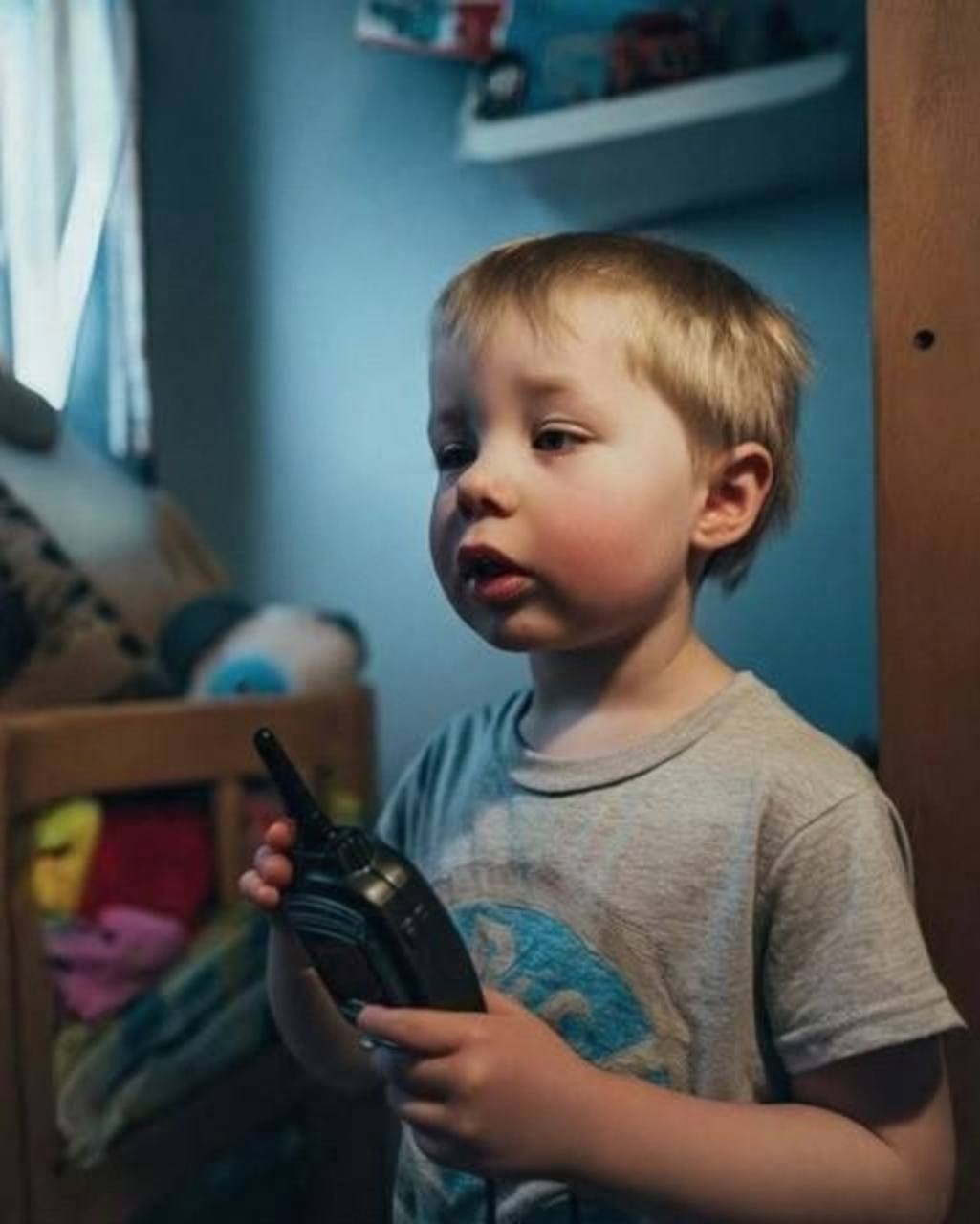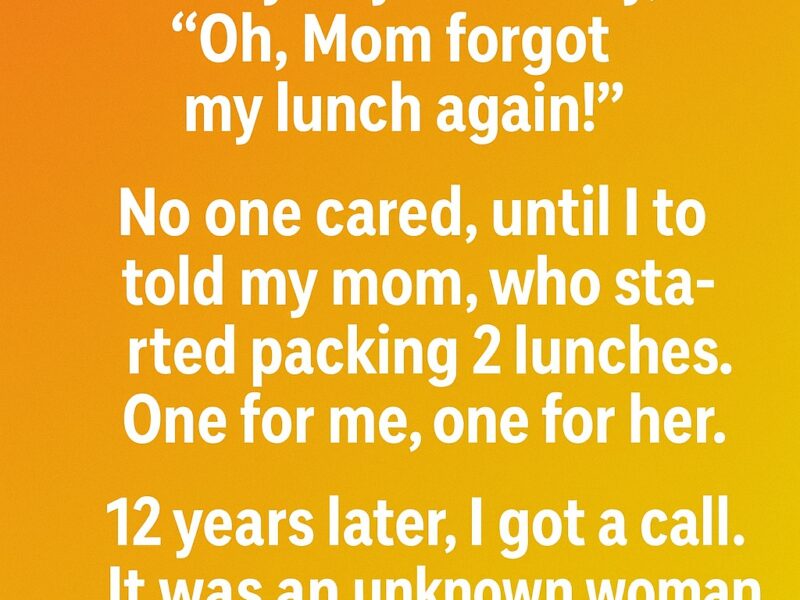I raised my son alone. Every meal, every bill, every scraped knee, I handled it by myself. I scrubbed floors, washed dishes, and worked late-night shifts so Thomas would never go without. I gave him everything—even my retirement savings—because I believed that love and sacrifice would one day be enough to earn respect in return. But it took a simple toy walkie-talkie from my grandson to show me just how wrong I was.
My name is Annie. I’m sixty years old, and for as long as I can remember, family has been my purpose. My husband passed when Thomas was only seven. From that day on, my life became about keeping us afloat. I worked any job I could find—cleaning offices, waiting tables, whatever kept a roof over our heads. Thomas grew up kind but spoiled by my sacrifices. I thought love would keep him grounded. Instead, it made him comfortable.
Thomas married Lila five years ago. She was bright, talkative, and seemed genuinely sweet. When she got pregnant with Max, they decided they wanted to live close. “That way, our little one can spend time with his grandma,” Thomas said, his eyes full of hope. I didn’t hesitate. I took $40,000 from my retirement savings and helped them buy an apartment in our complex. It wasn’t an investment—it was love in action. I believed being near them was worth more than any money I could ever save.
Now, I live across the hall in the same building. I still work long shifts at Murphy’s Diner. My hands are always red from soap and hot water, but I tell myself it’s worth it. When Thomas asked for help with Max’s daycare expenses last winter, I agreed without a second thought. “Mom, it’s $800 a month,” he told me, sounding worn down. I didn’t even question it. Every month, I sent the money. No excuses, no complaints. Max deserved the best, and if I could help, I would.
Then, one night, everything changed.
It was late Wednesday, after a ten-hour shift. My back ached, and I was too tired to even take off my shoes. I collapsed into my recliner, half-asleep, when I heard a soft crackle from the little toy walkie-talkie my grandson had given me earlier that week. “Hey Grandma Annie, this is for you!” he’d said, handing me the small plastic radio with sticky fingers. “Now we can talk even when I’m in my room!” It had been adorable—one of those gestures that warms your heart after a long day.
That night, the static came alive. “Hey Daddy, are you around?” It was Max’s sleepy voice. I smiled, expecting Thomas to answer back with some bedtime reassurance. But then I heard another voice—Lila’s. She was laughing, her tone light and casual.
“You know, Tom, I think we should rent out her spare room,” she said. “She’s hardly ever home anyway. We could get at least six hundred a month.”
I froze.
Thomas chuckled. “Yeah, Mom’s too trusting. Always has been.”
Lila kept going. “And once she agrees to cover Max’s swimming lessons too, we can finally plan that Hawaii trip. She’ll happily babysit for free, you know.”
My throat went dry. I felt like I was listening to strangers.
Then Lila laughed again, her voice sharp now. “The best part? She thinks daycare costs eight hundred. It’s only five hundred. We save three hundred a month, and she has no idea!”
Thomas laughed softly. “Yeah, and when she’s older, we’ll find a nice nursing home for her. Renting her place out will keep the income steady. She won’t even notice.”
The walkie-talkie slipped from my hand. It hit the floor with a hollow clatter. I sat in silence, staring at the wall that separated my apartment from theirs—the same wall my money had helped build. I wanted to cry, scream, something—but all I felt was a cold, empty ache.
That night, I didn’t sleep. Every time I closed my eyes, I heard Lila’s laughter, Thomas’s casual tone, the way they spoke about me like I was a burden, a resource, not a person. For years, I’d skipped meals so they wouldn’t have to struggle through a short month. I worked extra shifts so Max could have new clothes. And in return, I was a joke. A convenient wallet with wrinkles.
By morning, I’d made a decision.
Three days later, on Saturday, it was my birthday. I invited them over for dinner—just the three of them. Lila brought a grocery-store cake. Thomas kissed my cheek and said, “You look tired, Mom. Working too much again?” Max ran up and hugged my legs, beaming. “Happy birthday, Grandma!”
We ate dinner together, the air too cheerful, too rehearsed. Afterward, I lifted my cup of coffee and smiled. “Before we cut the cake,” I said, “I’d like to make a toast.”
“To family,” I began. “To the people we love, and the sacrifices we make for them.”
Thomas smiled awkwardly. “To family,” he echoed.
“When your father died, Thomas, I worked three jobs just to keep us going,” I said, my voice steady. “I gave you everything I had—including forty thousand dollars from my savings to buy this apartment. I pay eight hundred a month for Max’s daycare because I love him with all my heart. But recently, I learned something interesting.”
Lila’s smile faltered.
“The daycare doesn’t cost eight hundred. It costs five hundred.”
The room went still. Thomas went pale. Lila shifted in her seat.
“And apparently, you’ve been talking about renting out my spare room. About sending me to a nursing home when I ‘get too old.’” I looked between them. “After everything I’ve done, that’s how you see me? As extra income?”
“Mom, it’s not like that—” Thomas began, but I raised a hand.
“I don’t need excuses,” I said quietly. “I needed honesty. And you couldn’t give it.”
Lila tried to interject. “You must’ve overheard something out of context—”
“I overheard your truth,” I said sharply. “Thanks to Max’s walkie-talkie.”
Her face went pale.
I opened my checkbook and began writing. The pen moved slowly, but my resolve didn’t waver. “This is the last check for Max’s daycare,” I said, tearing it out. “Five hundred dollars. From now on, every cent I save will go into an account for him directly. When he turns eighteen, he’ll get it from me—not through you.”
Thomas’s jaw clenched. “Mom, we’re sorry. We’ll pay it back.”
“With what?” I asked quietly. “Integrity doesn’t come from money.”
The silence was heavy, broken only by Max’s small voice. “Grandma, are you mad at Daddy?”
I knelt beside him and touched his cheek. “Not at you, sweetheart. Never at you. We’ll still talk every night on our walkie-talkies, okay?”
He nodded, smiling again.
That night, after they left, I locked my door for the first time in years. It wasn’t out of anger—it was out of self-respect. I realized that love isn’t about endless giving. It’s about balance, boundaries, and truth. You can’t save people who choose to take advantage of you.
I still work at Murphy’s Diner, still come home with sore feet and cracked hands, but my heart feels lighter. I don’t send money anymore. I send love, time, and wisdom. And I keep one walkie-talkie by my bed.
Every night before I sleep, it crackles softly.
“Goodnight, Grandma,” Max’s little voice says.
And I press the button and smile. “Goodnight, my sweet boy. Grandma loves you—always.”


